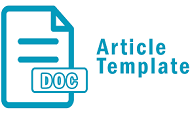The Voice of English Language Study Program Students towards Online Debate Learning during Pandemic Covid 19
Abstract
This research aims to find out the voice of ED students towards the effectiveness of online debate learning during pandemic Covid-19. This research use quantitative approach, and collects the data by questionnaire instruments trough Google Form. It took 32 participants of fourth semester in academic year 2020/2021. The result of this research revealed that percentage of students perception that used Likert Scale scoring and processed by using Formula of Sugiyono, the percentage is 63,74% which accumulated from the percentages of perception indicators that is Acceptance or Absorption is 61,32%, Understanding or Comprehending is 63,82%, and Evaluation or Assessment is 66,09%. This percentage is the good category that according to Sugiyono's classification which mentioned that 61-80% is classified as good perception. Even though, 63,74% is the low standard of perception score. This low average of perception caused by the students' negative perception that is complained about technical obstacles such as unstable internet connection, out of mobile quota, and also the limited internal storage. Furthermore, in open-question in the last part of questionnaire, there are only 2 students who have positive perception, 14 students have negative perception while 12 students have both positive and negative perception. From the result of all data process, I concluded that the students were perceived that this online learning is effective in replacing offline learning during pandemic Covid-19. However, the students preferred offline class in practicing debate skill. As the consequence, this research recommended the teacher and the students to always have a plan B in solving these obstacles during online debate amid pandemic Covid-19. In addition, this research still needs further study that can resolve their difficulties properly.
Keywords
Full Text:
PDFReferences
Akbar, Rofiq Faudy. (2015). Analisis Persepsi Pelajar Tingkat Menengah pada Sekolah Tinggi Agama Islam Negeri Kudus. Vol.10, No.1, Februari 2015, 189-209.
Alzamil, Abdulrahman. (2021). Teaching English Speaking Online versus Face-to-Face: Saudi Students' Experienceduring the COVID-19 Pandemic. Arab World English Journal, 12 (1) 19-27. DOI: https://dx.doi.org/10.24093/awej/vol12no1.2
Anggraini, Iga. (2021). Students' Perceptions of Online Learning English During the Covid-19 Pandemic. Jambi: UIN SulthanThahaSaifuddin
Arung, Fernandes. (2016). Improving The Students' Speaking Skill Through Debate Technique. Vol.1, No.1, March 2016, 71-76.
Asmara, Rekha. (2020). Teaching English In A Virtual Classroom UsingWhatsApp During COVID-19 Pandemic. Language and Education Journal. Vol. 5, No. 1, April 2020, 16-27.
Balan. (2011). The Roleof English in Present Day Higher Education. Research Gate.
Creswell, J.W. (2014). Research Design:Qualitative, Quantitative and Mixed Methods Approches: Fourth Edition. Thousand Oaks, CA: Sage Publications.
Dabbagh, N., & Bannan-Ritland, B. (2005). Online Learning: concepts, strategies and application. Pearson.
Djunubi, SintyaDewi. (2018). Students' Perception on the use Discussion Method in Learning Process. Gorontalo: FLC, UNG
Efrizal, Dedi. (2016). The Use of Debate Activities Improve Students' SpeakingAbillity at State Religious Senior HighSchool (MAN 02) of Kepahiang, Bengkulu, Indonesia. Bengkulu: IAIN Bengkulu
Fitri, Ayu., Hermansyah., Pratiwi, Etty., Aswadijaya. (2021). Teacher's Strategy in Teaching Speaking during COVID-19 Pandemic. Journal of English Education and Teaching (JEET). Vol. 5, No. 3, 2021, 349-367
Hafidz, Moh. (2020). The Dilematic On-Line English Learning During The COVID-19 Pandemy In Rural Area. Journal of English Teaching, AppliedLinguistics and Literatures (JETALL). Vol. 3, No. 2, 2020. 43-48.
Mulyani, Sri. (2020). Students' Perception and Motivation toward E-Learning during COVID-19 Pandemic (A Study at the Tenth Graders at SMA N 1 Suruh in the Academic Year of 2019/2020).Salatiga: IAIN Salatiga
Oxford University. (2011). Oxford Learners'Pocket Dictionary Fourt Edition. England: Oxford University Press
Qiong, 0. 2017. A BriefIntroduction to perception. Studies in Literature and Language, 19.
Rahayu, Retno Puji., & Yanti Wirza. (2020). Teachers' Perception of Online Learning during Pandemic Covid-19. Vol. 20, No. 3, December 2020, 392-406.
Rakhmanina, L., Feny M., Riang Br Halolo., Syafryadin., Noermanzah. (2020). Students' Perception On Online English Learning During COVID-19 Pandemic Era. Vol. 3, No. 2, December 2020, 428-439. DOI: https://doi.org/10.31540/silamparibisa.v3i2
Richard, Jack C & Rodger, Theodore S. (1986). Approaches and Method in LanguageTeaching: CommunicativeLanguageTeaching. Cambridge University Press.
Rifiyanti, Hafizah. (2020). Learners' Perception Of Online English Learning During COVID-19 Pandemic. Vol. 5, No. 1, September 2020, 31-35. DOI: http://dx.doi.org/10.30998/scope.v5i1.6719
Robbins, Stephen. P. (2007). Perilaku Organisasi Buku 1. Jakarta: Salemba Empat
S, Anne Ratna. (2020). Conducting Debate in EFL Classroom: Students' Perspectives.Garut: STKIP Garut
Sugiyono. (2010).Metode Penelitian Kuantitatif, Kualitatif dan R&D. Bandung: Alfabeta
Susila, Heni Rita., AriefQosim, Tri Rositasari. (2020). Students' Perception Of Online Learning In Covid-19 Pandemic: A Preparation For Developing A Strategy For Learning From Home. Universal Journal ofEducational Research 8(11B): 6042-6047, 2020. DOI: 10.13189/ujer.2020.082240
Utami, TariPutri. (2020). An Analysis of Teachers' Strategies on English E-Learning Classes during COVID-19 Pandemic. Salatiga: IAIN Salatiga
Walgito, Bimo. (2010). Pengantar Psikologi Umum. Yogyakarta: CV Andi Offset
Yunita, Wisma., & Ira Maisarah . (2020). Students' Perception On Learning Language At The Graduate Program Of English Education Amids The Covid-19 Pandemic. Vol, 6, No, 2, December 2020, 107-120. DOI:http://dx.doi.org/10.29300/ling.v6i2.3718
DOI: https://doi.org/10.37905/jbsb.v14i2.26666
Refbacks
- There are currently no refbacks.

This work is licensed under a Creative Commons Attribution-NonCommercial-NoDerivatives 4.0 International License.
Dipublikasikan oleh:
 | p-ISSN: 2088-6020 dan e-ISSN: 2776-5733 Jurusan Pendidikan Bahasa dan Sastra Indonesia, Fakultas Sastra dan Budaya, Universitas Negeri Gorontalo, Jl. Prof. Dr. Ing. B.J. Habibie, Desa Moutong, Kec. Tilongkabila, Kab. Bone Bolango Telepon (0435) 821125 Fax. (0435) 821752, email: jurnalbdb@gmail.com | http://ejurnal.ung.ac.id/index.php/JBSP/ |
Indexed by:
View My Stats situs toto






